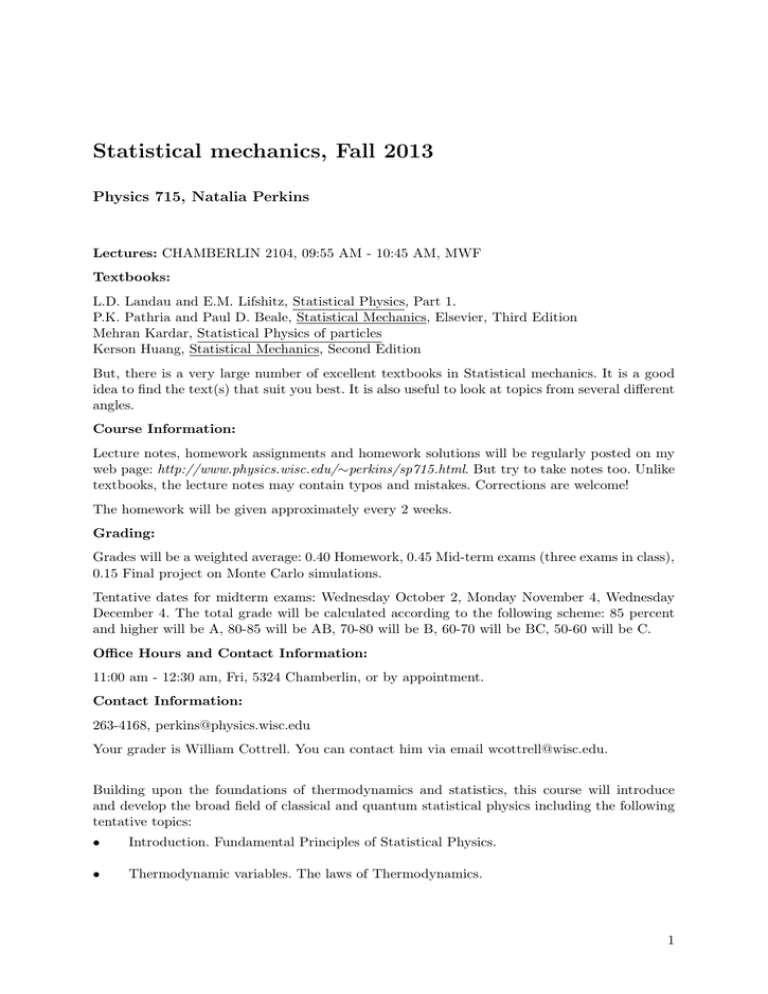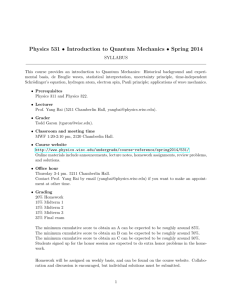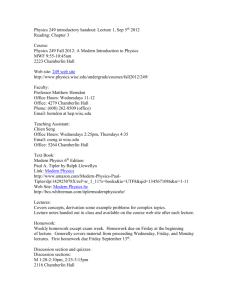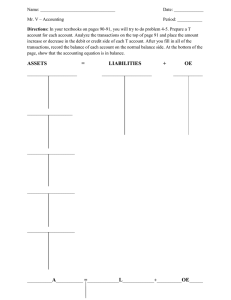Statistical mechanics, Fall 2013
advertisement

Statistical mechanics, Fall 2013 Physics 715, Natalia Perkins Lectures: CHAMBERLIN 2104, 09:55 AM - 10:45 AM, MWF Textbooks: L.D. Landau and E.M. Lifshitz, Statistical Physics, Part 1. P.K. Pathria and Paul D. Beale, Statistical Mechanics, Elsevier, Third Edition Mehran Kardar, Statistical Physics of particles Kerson Huang, Statistical Mechanics, Second Edition But, there is a very large number of excellent textbooks in Statistical mechanics. It is a good idea to find the text(s) that suit you best. It is also useful to look at topics from several different angles. Course Information: Lecture notes, homework assignments and homework solutions will be regularly posted on my web page: http://www.physics.wisc.edu/∼perkins/sp715.html. But try to take notes too. Unlike textbooks, the lecture notes may contain typos and mistakes. Corrections are welcome! The homework will be given approximately every 2 weeks. Grading: Grades will be a weighted average: 0.40 Homework, 0.45 Mid-term exams (three exams in class), 0.15 Final project on Monte Carlo simulations. Tentative dates for midterm exams: Wednesday October 2, Monday November 4, Wednesday December 4. The total grade will be calculated according to the following scheme: 85 percent and higher will be A, 80-85 will be AB, 70-80 will be B, 60-70 will be BC, 50-60 will be C. Office Hours and Contact Information: 11:00 am - 12:30 am, Fri, 5324 Chamberlin, or by appointment. Contact Information: 263-4168, perkins@physics.wisc.edu Your grader is William Cottrell. You can contact him via email wcottrell@wisc.edu. Building upon the foundations of thermodynamics and statistics, this course will introduce and develop the broad field of classical and quantum statistical physics including the following tentative topics: • Introduction. Fundamental Principles of Statistical Physics. • Thermodynamic variables. The laws of Thermodynamics. 1 • Gibbs and Maxwell distributions. The theory of simple gases. • Quantum gases. Fermi and Bose gases. Magnetism of electronic gas. Imperfect Fermi gas. Superfluidity. Liquid He. • Nonideal gases. Van-der-Vaals formula. Liquid-gas transition. • Magnetism. Mean-field theory. • 2D Ising model: Monte Carlo method and Metropolis algorithm. • Phase transitions and Critical Phenomena. Landau theory. Scaling approach. Critical exponents. Although these topics underpin a variety of subject areas, our focus is on the development of basic conceptual principles and technical fluency. 2


